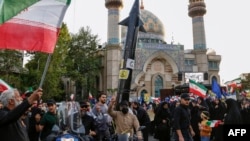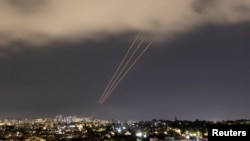Israeli military spokesman Rear Admiral Daniel Hagari said Iran would not get off "scot-free" after Iran and its allies launched a barrage of over 300 missiles, drones and rockets at Israel at the weekend.
"We cannot stand still from this kind of aggression," Hagari said, a day after Israel's military chief vowed there would "a response" to Iran's offensive.
Iran said its attack was an act of self-defense following a deadly Israeli air strike on its consulate in Syria, and that it would consider the matter "concluded" unless Israel retaliated.
Iran's President Ebrahim Raisi warned that "the slightest action against Iran's interests will definitely be met with a severe, extensive and painful response."
U.S. President Joe Biden stressed on Monday that "the United States is committed to Israel's security" and wants to prevent the conflict from spreading.
Washington, Israel's top ally and arms supplier, has made clear it will not join Israel in any attack on their common adversary Iran, a senior U.S. official said.
World leaders have urged restraint and de-escalation.
During a phone call with Iran's Raisi, Russian President Vladimir Putin called on both sides to "prevent a new round of confrontation fraught with catastrophic consequences for the entire region," the Kremlin said.
Israel has meanwhile kept bombing targets in Gaza, the Hamas-ruled coastal territory that has been largely devastated by more than six months of war and a siege on its 2.4 million people.
Israel weighs options
Since the Iranian attack, Israeli Prime Minister Benjamin Netanyahu has twice convened his war cabinet, set up after Palestinian militant group Hamas launched the October 7 attack that sparked the bloodiest ever Gaza war.
Israel was weighing its options after the Iranian drone and missile onslaught, which caused little damage as Israeli defenses intercepted most projectiles, helped by U.S., British and French forces as well as regional allies.
It remained unclear when Israel might strike and whether it would target Iran directly or attack its interests or allies abroad, including in Lebanon, Syria, Iraq and Yemen.
Iran-backed armed groups across the region have carried out attacks since the Israel-Hamas war broke out.
Hezbollah, which has been trading regular cross-border fire with Israel, claimed an attack with two explosive drones near a northern Israeli town on Tuesday, which the local council said wounded three people.
Also on Tuesday, an Israeli strike killed a local Hezbollah commander in southern Lebanon, a source close the group and the Israeli military said.
The deadly strike was followed by fresh rocket fire at Israel which Hezbollah said was "in response to the Israeli enemy's attacks."
Israel made its first official comment Monday on the strike that leveled a five-story Iranian consulate building on April 1, killing seven Iranian Revolutionary Guards including two generals.
"These were people who engaged in terrorism against the State of Israel," Hagari said.
Israeli Foreign Minister Israel Katz called on 32 countries to impose sanctions on Iran's Islamic Revolutionary Guard Corps and their missile program, he said on social media.
German Foreign Minister Annalena Baerbock, who will head to Israel on Tuesday, urged the European Union to impose sanctions on Iranian drone technology.
Gaza
Israel's military has vowed the Iran tensions will not distract it from the ongoing war in Gaza, where it aims to destroy Hamas and bring home the hostages taken during the Hamas attack more than six months ago.
On Tuesday, Netanyahu told new army recruits that Israeli forces were fighting Hamas "without mercy."
"Iran stands behind Hamas, behind Hezbollah and behind others, but we are determined to win," he said.
Truce talks involving U.S., Qatari and Egyptian mediators have so far failed to bring a deal, and Israel has rejected a Hamas demand that it withdraw its forces from Gaza.
The Hamas attack that started the war on October 7 resulted in the deaths of 1,170 people, mostly civilians, according to Israeli figures.
The militants also took about 250 hostages, of whom Israel estimates 129 remain in Gaza, including 34 who are presumed dead.
Israel's retaliatory offensive has killed at least 33,843 people in Gaza, mostly women and children, according to the health ministry in the Hamas-run territory.
It reported that 15 people, including children, were killed Tuesday in the southern city of Khan Yunis.
The Israeli army said that in ongoing combat in central Gaza, its tanks killed "a number of terrorists identified advancing towards them."
Aid
Israel has faced growing global opposition to the relentless fighting that has reduced vast areas of Gaza to a wasteland of gutted buildings, bomb craters and mountains of rubble.
The war and siege have triggered a dire humanitarian crisis in Gaza, with desperate shortages of food, water, medicines and fuel.
The United Nations agency for Palestinian refugees, UNRWA, said there had been "no significant change" in the amount of humanitarian relief entering Gaza, even after the International Court of Justice had ordered Israel to allow in more aid.
UNRWA said "181 aid trucks have crossed into Gaza per day" so far in April, far below pre-war figures that also included commercial trucks.
Despite objections from Washington, Netanyahu has insisted the army will invade Gaza's far-southern city of Rafah where some 1.5 million people shelter.








Forum